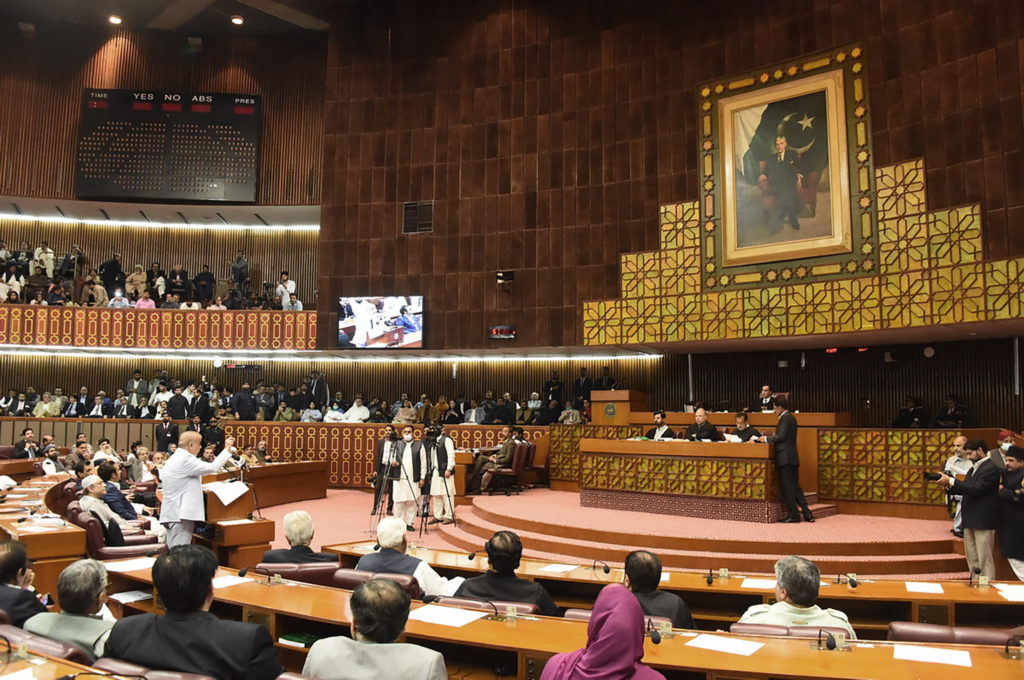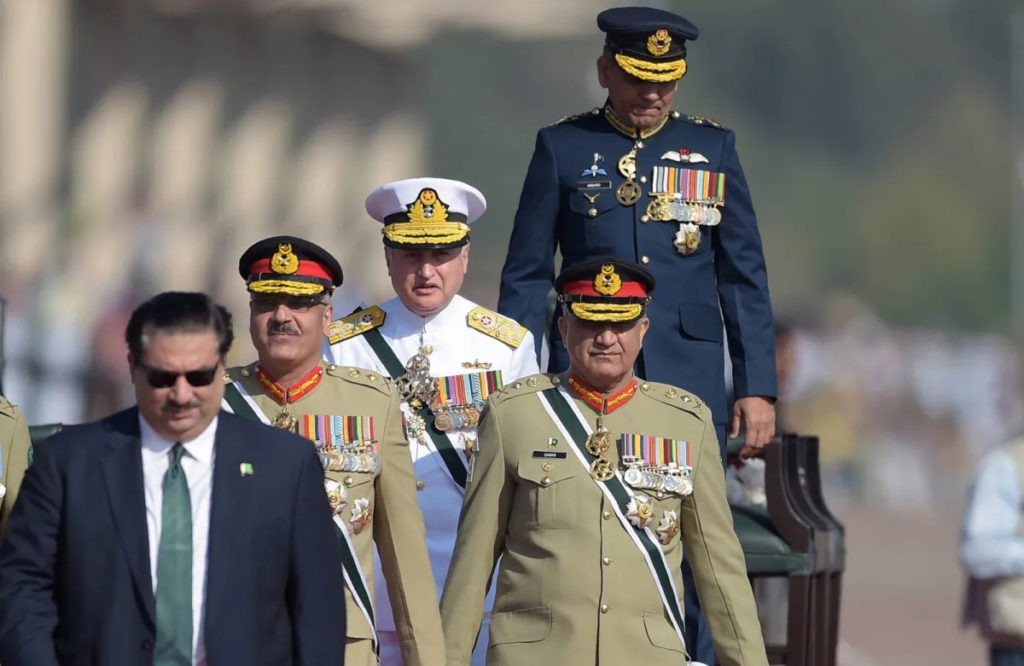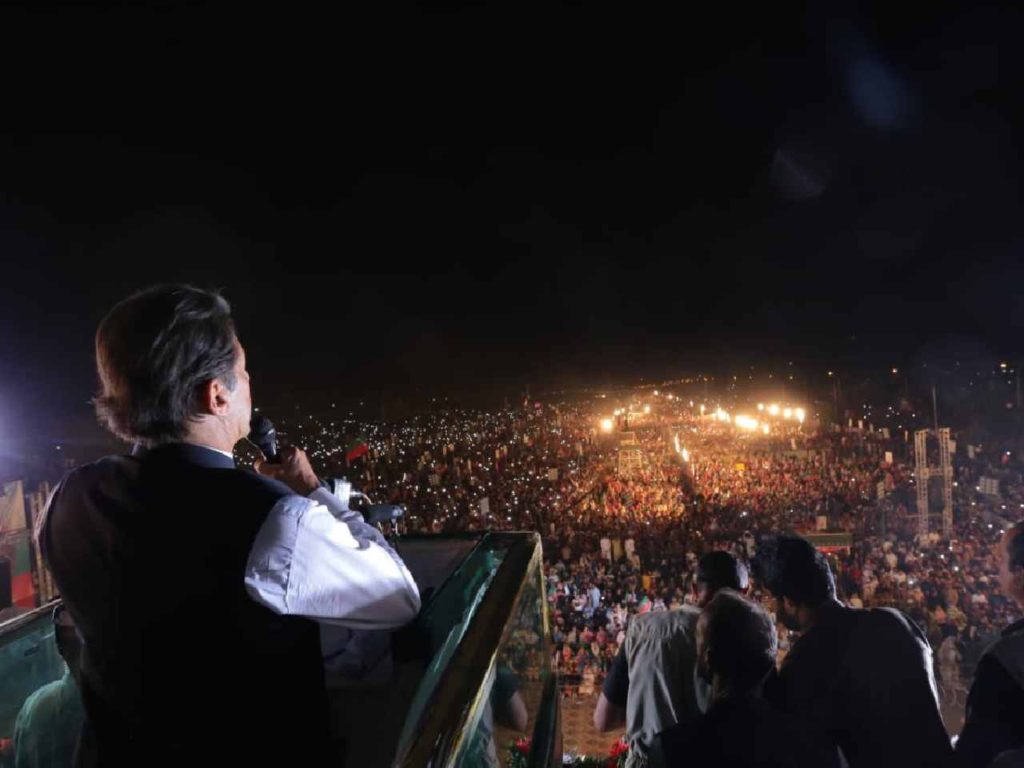Newspaper Article 16/05/2022
Anti-Americanism has never ever united Pakistanis. It was a ploy. It has always been a theatrical call by politicians leaning on the right side of the divide, primarily reactionary-or-orthodox elements. Nor has campaigning against Washington brought in dividends. Rather, this love-hate-card was used for petty personalized objectives, and none other than the administrations in the White House understood this in a better way. Neither any election was won on hate-America slogan, nor did religious parties clinch any sizable number of seats. Rather, to judge rationally, Pakistanis always awed the United States and were impressed with its egalitarian manifesto of pluralism, democracy and civil liberties.
But all that seems to be changing in the political context for good, and that too for the first time in history. Anti-American sentiments are working. I will not go into the legalities and technicalities of the cipher from Washington, known as ‘Letter-Gate’, which has led to a landslide on the political horizon. But the point is that it has led to the first-ever regime change in Pakistan. One of the most charismatic leaders and a Chief Executive who, at least, had a vision to transform the country into a welfare state has been sent packing by the powers-that-be in Islamabad. The pattern and mode of execution is still not clear, though. The conspiracy-cum-intervention strategy is yet to be known.
The whisper is that the United States wished to take down Imran Khan, and it was done. State institutions, the powerful Establishment and Who’s Who that matter looked the other way round.
Prime Minister Imran Khan walked away by holding his personal diary, the moment the parliament met in the wee hours of Sunday to oust him through a doctored majority on the floor of the house. This is current history, and the preamble perhaps was written in Washington. It was signed and executed in Pakistan at the behest of collaborators and well-wishers. Rest is history.
This unprecedented chapter of intervention, or what is officially confirmed as ‘blatant interference’ on the part of the United States by the National Security Committee of the State of Pakistan (not once but twice) has ushered in renewed nationalism.
The government of Imran Khan may be gone, but it has led a Pakistan Spring – similar on the lines of Arab Spring, which had changed the Middle East for all times to come. Peshawar, Karachi, Lahore and Islamabad are now Tahrir Squares for Pakistanis!

Pakistanis now are proud patriots, and they see in Mr. Khan’s ‘absolutely not’ dictum a Charter of Change. They may have read and heard of Muhammad Ali Jinnah, who tirelessly campaigned and created a country for the Muslims of the Subcontinent through a constitutional struggle, but now they eulogize the fallen Prime Minister as an idol for re-erecting a New Pakistan – one that should be proud of its independence, assert an independent foreign policy, believe in equality with all in the comity of nations and follow a self-reliant policy at home. Had this so-called Cable Communique not been leaked, Pakistanis would have been content with their erstwhile snobbish attitude of their own and deep in slumber. Thank you, US Under-Secretary of State Mr. Donald Lu for making that happen!!
What’s next? What is the narrative now? Again, a glance into history will give us some apt references. Let’s draw a resemblance, and I feel like referring to it. In fact, this regime change has led to a change of decorum in mindset.
I’m sure not many would remember as to who were called ‘November Criminals’ in history? They were abettors, who disgraced a proud nationalist Germany in the closing days of World War 1, and made it taste the worst-ever humiliation.
The Treaty of Versailles 1919, which brought an end to World War 1, by signing the armistice is remembered as a conspiracy against Germany. None but German politicians were hand in glove with Allied Powers to make that happen. That piece of stubborn narration worked and the rise of Adolf Hitler is a case in point. Pakistan too seems to be in a similar loop, if the arousing mood of the overwhelming people is any criterion. The point that Pakistanis at home and abroad are rallying with Imran Khan for a sovereign Pakistan, and refusing to take in dictation from the lone superpower and are willing to go to any length is a miracle.
It is a complete political transformation in evolutionary essence and is, indeed, leading to a revolution. Burying head in the sand like an Ostrich by denying this phenomenon will be suicidal. Regime change has set in a snowball reaction and Pakistan will never be the same again.
Now, let’s see the fault-lines and what led to the exit of Prime Minister Imran Khan — in a first of its kind overt-cum-covert operation in Pakistan:
• The Captain-cum-Skipper was never a pen-pusher Prime Minister! He was a thinking chief executive and not only read between the lines, but also had the capacity to take on big wigs. This doesn’t mean that he never committed mistakes. If the candid discussion that Army Chief General Qamar Javed Bajwa held with his ex-servicemen in Lahore is any criterion, PM Khan is primarily blamed for taking a solo flight. Mr. Khan apparently stepped into the no-go territory primarily related to foreign policy. Likewise, reneging on a politically weak incumbent as Punjab Chief Minister, who was never a doer, he furthered the gulf with the Establishment. Last but not least was his humble opinion that the former spy chief should stay on for some more time in the wake of revulsion in Afghanistan at the hands of Taliban 2.0. This landed him in discord with the Army. So much so as the contentious charge-sheet against him.
• Yet those were not the immediate reasons for his ouster. Mr. Khan, in pursuit of an independent foreign policy, crossed swords with the White House. He gave a shut-up call when asked to lend Pakistan’s soil and airspace for (mis)adventures in Afghanistan. The US had asked for a pound of flesh without dripping a drop of blood. That was not supposed to happen, at least under PM Khan. The ‘Absolutely Not’ utterance sealed his fate. But as history would have it, it made him a legend for all times to come.

His defiance to say ‘No’ to the United States has ushered in neo-nationalism. The nation was never as united and proud as it is now. Mr. Khan has just furthered the envelope of nationalism and oneness.
• The Yatra to Russia and the iron handshake with the Czar, Vladimir Putin, came with a critical cost of its own. The Prime Minister was contemplating an out-of-the-box solution with Moscow to address the energy woes. Pakistan was reportedly in the process of signing a Rupee-Ruble deal for oil, and also contracts on import of wheat. The cue was taken from Indo-Russia understanding. Moscow had hinted at selling both the products at 30 percent less cost, and that too on easy terms. The Americans read the defiance in the context of the 1974 petrodollar deal, which is collapsing anyway. The new accord, if replicated by many developing countries, would have come at the cost of greenback’s supremacy. Mr. Khan had already set a precedent by striking a Rupee-Yuan deal in 2019 with China.
• The million-dollar question is, was there a regime change plan on the part of the United States or not? And if so, then surely there would be some abettors and facilitators at home, too? And what was the pivot of such a plot? Simple geostrategic arithmetic suggests that there was an emerging vacuum in Southwest Asia since the debacle of Washington in Kabul on August 15, 2021. The hurried exit of US forces and the return of the Taliban was a Waterloo for President Biden. The White House was pondering over a strategy to stage a comeback in the region, the CENTCOM in the Middle East was proactive, and the radar was focused on how to tame China and ‘discipline’ states that are at the vanguard of the Belt and Road Initiative. Pakistan obviously was a thorn in the eyes of the US.
• Thus, came the covert demand for use of Pakistan’s airspace and bases to oversee stunts in Afghanistan. Prime Minister Imran Khan was the biggest obstacle. He had choreographed his regional vision by refusing to fight other’s wars. This wasn’t his diatribe since coming into power, rather he had canvassed it for more than two decades. The odd man was identified.
• Then onwards it was a phoenix in the making: the dots need to be reconnected. The defunct PDM found a new lease of life. PPP’s stated position of letting every elected government complete its tenure took a U-turn. The Establishment suddenly realized that it is on the wrong side of the divide. The engineered change of heart of the governmental-allies was fait accompli. The contents of cable-communiqué, which clearly called for Imran Khan’s exit, were initially hidden from the PM himself.
• PM Khan played Zulfiqar Ali Bhutto’s role as he waived the cable-gate in a public rally. It was a Déjà vu for many as Bhutto in Rawalpindi’s Raja Bazar had displayed a similar letter written by the then Secretary of State Cyrus Vance, threatening Bhutto of dire consequences. This time it was Donald Lu, who categorically told Pakistan’s Ambassador to the United States Asad Majeed that the White House wants to see PM Khan’s exit through the vote of no-trust, otherwise…!
• Let’s jot down the post-script: PM Imran is taken out. Drones are back in action. The new dispensation has received laurels from White House. A new understanding is in the making and $200 million have come to our coffers from Washington. Isn’t this the reward that was promised in the Cable-Communique?
• Yet we are playing with vocabulary of whether it was a conspiracy or not? Blatant interference and not conspiracy, we are assured! Saddam Hussein, Muammar Gadhafi, Mullah Omar, Mosaddegh, Anwar Sadat, Osama bin Laden and umpteenth others in Latin America were taken out by the United States through ‘interference’. They all faced a plot, which is called conspiracy. But in our case, the bitter half-truth is yet to be told.
As we go into print (in the last week of April),

Imran Khan has hit the streets. He is at the zenith of his popularity. He has nothing to lose. He is no more in need of political allies to campaign a comeback. Civil society, academia, the down-trodden, the middle class, the elite, the ex-servicemen cadre, the generic media, the expatriates and the who’s who of public integrity now rally for him.
Though Khan frequently refers to the ‘Letter-Gate’, he is not an anti-American, per se. Nor are the people on streets nursing a vendetta against the White House.
All they mean to say is that Mr. Khan’s legitimate government has been shown the door through ‘blatant interference’ and that is unacceptable.
In a statesmanship spirit, Mr. Khan has refused to cross the threshold. He still believes in a respectable détente with the powers-that-be at home and abroad – but not at the cost of self-respect and national dignity. The nation believes in him. Time to make amends, the sooner the better. Let there be no ‘April criminals’ to be named as history is written.
Note: This article appeared in Defence Journal, dated 10 May 2022.
Disclaimer: The views expressed in the article are of the author and do not necessarily represent Institute’s policy.
